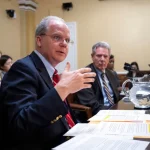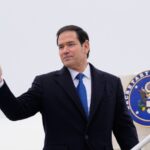

I saw the very worst, and the very best, of humanity in Israel this week.
I saw a mother and her two daughters, her only children, buried together in a field after they were murdered by Palestinian terrorists in their home at Kibbutz Be’eri.
The husband, the father, could not say memorial prayers because he is still missing.
His brother is being held hostage, somewhere in the tunnels Hamas has dug for itself rather than building anything for the Palestinian people.
I saw refrigerated trucks full of dead and decaying bodies, hundreds of corpses, including those of children, murdered for no reason other than the fact that they were Israeli, or Jewish. I saw the mist float out of the containers and breathed the scent of death.
I saw footage of the attack, saw teenage girls begging in vain for their lives; saw a terrorist toss a grenade into a bomb shelter to kill a father in front of his two boys; saw the boys, one now blind, wail in terror.
I saw the bullet holes in the kindergarten; saw the “safe room” door, where the children hid, twisted off its hinges by an explosion. I saw the holiday decorations, picked up the bullet casings still on the ground.
I saw the footage of drivers being murdered in their cars; I heard firsthand accounts of the naked bodies of women, found on the roadways after they had been raped.
Who would have thought such things were possible? Who would dare to excuse them?
I also saw volunteers braving rocket fire to bring meals to people too old or too disabled to leave their bomb shelters. I met fathers who said goodbye to their wives and children and raced toward the front to join the fight.
I met a mother who learned, after several days, that her daughter had been murdered at the Supernova music festival, and who still kept coming back to the center for the families of hostages and missing people, so she could comfort them.
I came to Israel because I wanted to be there, now, despite the dangers.
My flight from Los Angeles was full of Israeli families coming home, in wartime, defying the claim by anti-Israel activists that the “zionists” were frightened and desperate to flee.
I came to Israel because I wanted to be alongside these brave, beautiful people, these children of Israel, who fight on through the tears and who reach out to each other with love, in the face of unbelievable hate.
I am proud that these are my people, both the Jewish people and those who have chosen to join their lives to the Jewish destiny.
I wondered, before I arrived, whether the haters were right — whether Israelis would look around at the dangers facing them on every border and decide that the whole idea just wasn’t worth it anymore, that life was simpler and safer in Beverly Hills or in Skokie or in Golders Green, that it was best to leave this brutal region to its own fate.
I found the opposite.
I found a nation digging in, planting its feet more firmly in the soil and raising its flag even higher.
“We will win together,” the banners say, and that is what people believe.
The political differences of just a few weeks ago have been set aside; the activists who marched in the streets for months against the government’s judicial reforms have turned their organization into a distribution network for donated food, clothes, and other necessities.
Joel B. Pollak / Breitbart News
Besides, there is no choice.
The mobs chanting “Free Palestine” on our streets, protesting outside Jewish institutions, and promising to uproot every “settler” from Israel, without one word of criticism for the terrorists, are making it clear that the Jews of Israel have nowhere else to go.
If you cannot condemn the murder of Jews — if, indeed, you celebrate it because you are savoring the spectacle of fear — then why should Jews leave Israel to live alongside you?
The antisemitism on the American left, especially on the college campuses that nurture the activists and leaders of the Democratic Party, has been exposed over the past few weeks.
But so, too, has an old prejudice on the right, a narrow-mindedness that says what is happening to Jews over there is not our business, and not our fight.
For many Jews outside Israel, this is a time of deep anxiety. Many of us do not know where to turn. And there are no political answers.
President Joe Biden stood with Israel in its hour of need, bringing comfort to an embattled nation. But his policies — giving billions of dollars to Iran, giving money to Palestinian groups that had been withheld because of concerns about terror — encouraged Israel’s enemies.
Israel was safer when Donald Trump was president — but he is so obsessed with settling old scores from 2020 that he mocked Israel’s leaders after the attack.
Where do Jewish voters go?
Add to that the fact that Republicans in the House of Representatives had just ousted their leader, Rep. Kevin McCarthy (R-CA), one of the strongest voices in Congress for Israel.
Earlier this year, McCarthy defied Biden’s pressure on the Israeli government — how misguided that all seems now! — and led a bipartisan delegation to Israel.
Then he was dumped by a fringe of the party, leaving Republicans voiceless for three weeks as Israel fought for its very existence.
The lesson of this terrible yet heroic experience has been the importance of self-reliance.
It was armed Israeli civilians, not the army, who first stopped the enemy. Volunteers, not government agencies, are keeping people fed.
There is a familiar Hebrew song for the upcoming Chanukah holiday: “Who can retell the things that befell us/Who can count them?/In every age/A hero or sage/Came to our aid.”
We, ourselves, must be those heroes and sages. It is happening.
Joel B. Pollak is Senior Editor-at-Large at Breitbart News and the host of Breitbart News Sunday on Sirius XM Patriot on Sunday evenings from 7 p.m. to 10 p.m. ET (4 p.m. to 7 p.m. PT). He is the author of the new biography, Rhoda: ‘Comrade Kadalie, You Are Out of Order’. He is also the author of the recent e-book, Neither Free nor Fair: The 2020 U.S. Presidential Election. He is a winner of the 2018 Robert Novak Journalism Alumni Fellowship. Follow him on Twitter at @joelpollak.
This column marks the tenth anniversary of “Blue State Blues.”





